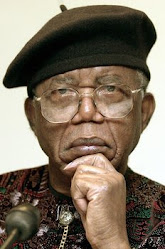 Warp, Misery, Return of the Okinawa Prince, Lacerations, Set Theory, Special Secretary, It Happened in Benin, Lots of Muscle and Lots of Blood, My Super-hero Story, and The X12 Moon-Shade, are the ten titles in this lackluster collection of tales.
Warp, Misery, Return of the Okinawa Prince, Lacerations, Set Theory, Special Secretary, It Happened in Benin, Lots of Muscle and Lots of Blood, My Super-hero Story, and The X12 Moon-Shade, are the ten titles in this lackluster collection of tales.In the opening story Warp, passengers at an Obalende bus stop in Lagos, Nigeria board an old Datsun taxi steered by an eccentric and oddly dressed man and they take flight at the end of this hard-to-swallow tale. I found Misery, the second tale in the collection more likable than anything else in the collection but that is not saying it is fantastic. The protagonist (whose name "does not matter") is tired of filthy Lagos with all of its sorrow, despair and corruption and he is headed home to the warmth of his beloved wife after the day's wandering. There is genuineness to the anger and frustration about the state of Lagos that it is surely a release for the author to say the things he does.
In Return of the Okinawa Prince, an elderly man returns to a treasured school for the Martial Arts and is very disappointed by the state in which he finds it. In Lacerations a man boards a commercial bus that contains five pretend-passengers who attack him. Arigbabu's graphic narration of the attack and struggle that ensue caused me to cringe. The described action makes you wonder what sort of spacious vehicle the characters must have been in to do all of that. It is a poorly written self-defense fantasy.
The next tale Set Theory competes with the closing tale, The X12 Moon-Shade Lamp for the title of Most Obtuse. In Set Theory an old man returns from the mountains 150 years after he left to query the gods for an answer to his village's problems. The proffered solution from the gods "[I]s a complex mathematical equation you must all resolve in teams using algebra, calculus and chaos theory." The gods want the village to solve math problems? Granted the answer should not be cliche but telling a village to solve math problems is just through the roof for me. Special Secretary Ngozi Njoku is a "private eye extraordinaire and sworn defender of abused women" who has been hired by Mrs. Bakare to find out if her wealthy husband is having an affair. On the job she realizes that things are much more complicated than they seem. It Happened in Benin is a poem.
In the tale Lots of Muscle and Lots of Blood, a man escapes the two women in his life, his wife and controlling mother, via a dream. He goes to Ghana for some alone time and revisits a side of himself he left behind a long time ago. The protagonist of My Super-hero Story is a secret agent working undercover to steal pertinent information from his boss, the shady Editor of a big newspaper house. The last tale, The X12 Moon-Shade, barely a page long, gives the history of the X12 lamp and advises humans to exercise caution because Martians monitor earthlings through the lamp.
A Fistful of Tales is energetic but grossly underwhelming. I feel that the accompanying illustrations belittled the book and the narrated action scenes did not come off the page successfully. Science fiction in the Nigerian context is not something we are familiar with and it will take a crafty Nigerian storyteller to make stories of that nature that are set in a Nigerian context appealing as opposed to far-fetched. A Fistful of Tales does not pack a punch.
[Image via Ireaddadabooks]


















Osondu,
ReplyDeleteJust the way you explained this book to me over the phone...
But of course, I'd still get it and form my opinion. Your reviews are ALWAYS helpful.
I haven't read the book but its interesting premise will certainly make me read it one of these days. Too bad it's not available in the US.
ReplyDeleteI think you need to reread it, Osondu. It may not appear appealing to you, because it is written by a Nigerian and it is sci-fi, but those who don't know the Nigerian geography can agree is a wonderful book.
ReplyDeleteI actually believe this review does not do justice to the book. i actually read the book twice and it makes a lot of sense to me. Maybe you should re-read it when you are in a good mood, your remarks might then be kinder.
ReplyDeleterucorianGood review.
ReplyDeleteThis comment has been removed by the author.
ReplyDeleteThis man, how have you been?
ReplyDelete@Anonymous the first- Thanks for your comment. I don't need to reread A Fistful of Tales, my first reading told me all I needed to know in order to form my opinion.
ReplyDelete@Anonymous the second- Thanks a lot for commenting. Books are often that way, they make sense to one and none at all to the other.
@Anonymous the third- Thanks a lot.
@Aloofar- Bro I've been good. Haven't caught anything from you in a long time. What have you been up to?
a mix of sci-fi and thriller in a Nigerian setting! sounds like it will be an interesting read
ReplyDeleteI bought this book and regret wasting my money. Readers should be given the right to demand their money back for such crap. The book is rubbish - plain and simple. The author has no business writing. In my opinion Osondu, you were too kind. It is not energetic - not even the illustrations. There is no redeeming quality about this group of senseless jottings masquerading as a book. And to think that trees 'lost their lives' to produce such trash angers me.
ReplyDelete